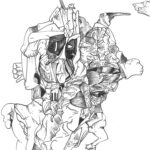Tidldibab (for beginners)
I crushed my cigarette into the
safety of flat, white ashes, watching
the smoke tread up among
clouds creased into these
craven shapes that
gingerly fade and
escape the sky—and
muscled up out of the
white-knuckled, cloud-muzzled,
muttering sunrise, some
quaint cut of an epitaph’s
cousin:
Mold grown over the
mold again—note
What blistering gifts
entrained in a thumb-
print, callused from
picking at so many
bolts, stripped
all of it soft as the
shirts that my grandmother’d
offered me, dregs of a dew-damp
aside, those
delicate flannels
my grandfather no longer
fit in—as well as a pair of white
oversized socks that had haughtily
disregarded the fact that my foot was
larger than what strange he squeezed
in a work boot.
—
My grandfather’d kept a bramble of anvils
thumbtacked together to shoulder a shed.
Each house he’d had, four
mortgages coldly afforded from
whispering proverbs to pistons, wearing
incomparable thumbprints down into
black-iron casts of milk glass-smooth tonsures
from loosening lockjawed bolts and Heineken caps,
from sussing the sweat and the schmutz
from an engine; had
each a similar shed,
you’d dare not mention
aloud for fear of it filling with
dybbuks reduced to
woodgrain gusseting
ribs of young Bluebeard’s
bloated potato barn—once,
he ushered me over to witness
the door uncurl from its verdigrised hinges, and
rolled out a rusted patio table like
Sisyphus taking a day at the races. He
always wore these paper-frail v-neck tees
and jeans to cover his crepe-paper body. He,
well into his sixties, still could calmly suspend himself
straight from a t-boned fence post, perfectly
level with earth, even given its
gaily lazing curve, yes, perfectly
parallel. Parallel meaning that he and the
earth should never meet, for a moment, the
two of them damn near perfectly twain, except
for the stock stiff fencepost spelling out mercy
or mercy me, maybe, too deep in the flickering
woodgrain, really, for anyone willing to see it—
He gave me the patio table to salve and
sell as a vessel of oenomel vintage. He’d
never quite found the time to refurbish it. There-
by the anvils staked their claim, and I asked,
amid a frank flurry of each of his
four hunched children scribbling
names on an orgy of moldering heirlooms,
What’s with all the anvils, Papaw?
You can’t have my anvils, he mercifully
muttered. No, really, I spluttered, why
all the anvils—now, this old
man that my father (his former
son-in-law) commonly
muttered of, clambering
praise, your grandfather works
like an animal; this small
man, whose
legs, reflecting
a maglite, just
might elbow a
hole in the Hoover
Dam, this man, who
spent every cheeseparing hour
immersed in a moat of work
with a snorkel of maybe
two Heinekens nightly, told me,
colder than stars collapse, I wanted
to take up blacksmithing—albeit
I’d yet to find the time for it.
It recalled
my father’s father once confiding
in me (a seduction, really, that led
to him asking me, telling me, You, yes,
you should chronicle [what was] my life),
that Arlene, my father’s mother (replaced
by Darlene, some years later) had wanted for years
to be but a dressmaker—that, evermore tacitly
tragic still, that he, whose life had demanded
a chronicle, went to my local baker and said,
you should train me. The Baker said, no.
You wouldn’t much like it. I asked him again,
and we’ll leave it at that. He’s retired and
twice now, once
as a cop and once
as a, what’s the politest way to say it, a
corrections officer, a
prison guard, left
whittling down his
ribs and knees with
a sharpened spoon he’d
honed upon how many
broken bowls of spaghetti-
ing dreams drawn up in a listess
bone-braced cyst. At twenty,
he’d sired two children already.
A tidldibab is, of course, an invented name
for a bone with a hole in it somebody took
for an heirloom instrument, one that be-
queathed the urge to make music out
of, well, just about anything really—
That was the mold
grown over with
mold again: note
what blistering gifts
entrained in a thumb-
print, callused from
picking at so many
bolts, stripped.
4 thoughts on "Tidldibab (for beginners)"
Leave a Reply
You must be logged in to post a comment.


OMG so many great lines in this and the struggle, the endurance, the blistering gift of this poem. DAMN. I need a novel in verse about these characters.
I loved every word of this. Bravo.
Title grabs. Too many favorite lines to mention here so will pick my very favorite of all: dregs of a dew-damp
aside
And delighted to learn the meaning of tidldibab!
Wow, just wow. Too many great lines to mention them all.
I’m left in tears. I agree that a novel sized version would be welcome.
The shape, the shape tells part of the story. I love that.
Some lines I can’t NOT mention,
“My grandfather’d kept a bramble of anvils
thumbtacked together to shoulder a shed.”
” how many
broken bowls of spaghetti-
ing dreams”
“with a snorkel of maybe
two Heinekens nightly, told me,
colder than stars collapse….”
I mean, Jeez Goldie! Insane!